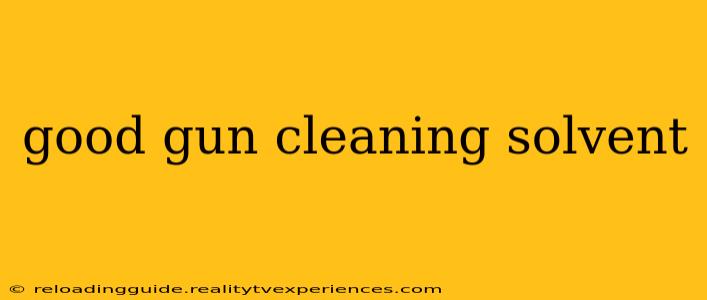Cleaning your firearms is crucial for maintaining their functionality, accuracy, and longevity. A good gun cleaning solvent is the cornerstone of this process, effectively removing residue, preventing corrosion, and ensuring your weapon remains in top condition. But with so many options on the market, choosing the right one can feel overwhelming. This guide will help you navigate the world of gun cleaning solvents, explaining the key factors to consider and highlighting some top contenders.
Understanding Gun Cleaning Solvents
Gun cleaning solvents are formulated to dissolve and remove various residues left behind after firing. These residues include:
- Powder residue: The unburnt powder and byproducts of combustion.
- Lead: From lead bullets, which can build up and damage the barrel.
- Copper: From jacketed bullets, contributing to fouling and accuracy issues.
- Carbon: A byproduct of combustion that can lead to malfunctions.
Different solvents are formulated to tackle these residues with varying degrees of effectiveness. Some are designed for general cleaning, while others specialize in removing specific types of fouling.
Key Factors to Consider When Choosing a Solvent
Selecting the best gun cleaning solvent depends on several factors:
- Type of firearm: The solvent's compatibility with the firearm's materials is crucial. Some solvents are harsher and may not be suitable for all finishes.
- Type of ammunition: The type of ammunition used impacts the type of residue left behind, influencing the solvent's effectiveness. Lead-based ammunition, for instance, requires a solvent specifically designed to remove lead fouling.
- Cleaning method: Some solvents are designed for use with patches and brushes, while others are suitable for ultrasonic cleaning.
- Personal preferences: Some shooters prefer solvents with specific scents or formulations.
Types of Gun Cleaning Solvents
Gun cleaning solvents generally fall into a few categories:
1. Non-chlorinated Solvents:
These are generally considered safer for the environment and less harsh on firearm finishes. They are effective at removing most types of fouling, though they might require more effort for stubborn residues. Many modern solvents fall into this category.
2. Chlorinated Solvents:
These were once very popular due to their strong cleaning power. However, many are now considered hazardous to the environment and potentially harmful to health. Their use should be carefully considered, and appropriate safety precautions must always be followed. Their stronger cleaning properties may damage certain firearm finishes, too.
3. Specialty Solvents:
These are designed to target specific types of fouling. For example, copper solvents are formulated to remove copper fouling from the barrel, improving accuracy. Lead solvents are similarly specialized to tackle lead buildup.
Top Solvent Considerations (No Specific Brand Recommendations)
Rather than recommending specific brands (as this can quickly become outdated and biased), we will highlight features to look for in a quality solvent:
- Ease of use: The solvent should be easy to apply and remove.
- Effectiveness: It should effectively remove powder residue, lead, copper, and carbon.
- Safety: The solvent should be safe for the user and the environment, minimizing harmful fumes and chemicals.
- Compatibility: It should be compatible with various firearm finishes and materials.
- Biodegradability: Look for solvents that are biodegradable and environmentally friendly.
Conclusion: Maintaining Your Firearms
Choosing the right gun cleaning solvent is vital for maintaining your firearms and ensuring their optimal performance. By carefully considering the factors discussed above—firearm type, ammunition used, cleaning method, and personal preferences—you can select a solvent that meets your specific needs and helps you keep your weapons in peak condition. Always refer to the manufacturer's instructions for your firearm and solvent for safe and effective cleaning. Remember safety is paramount; always work in a well-ventilated area and wear appropriate personal protective equipment.

